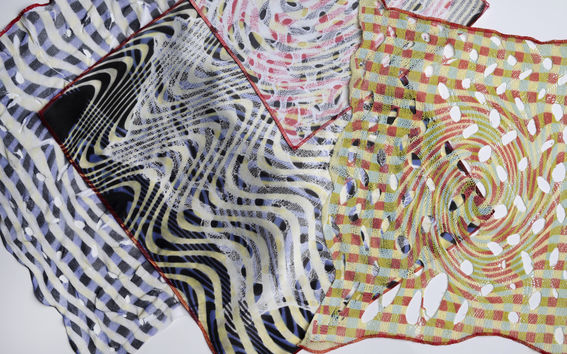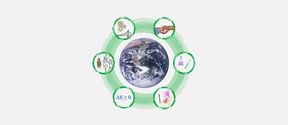What is the future of digital textile printing?

Textile and print design is facing a new era. Technological developments are constantly opening up new possibilities, and Aalto University fashion and textile design students are increasingly using digital textile printing to design printed fabrics and products for fashion and interior design. This is one of the reasons why textile printer manufacturer Epson has been collaborating with Aalto University in the field of digital textile printing since 2019.
This spring, Epson and Aalto University organised an Epson Textile Print competition in conjunction with the Advanced Textile Workshop courses for Master's degree students, where students used Epson's textile printers.
The competition kicked off with a two-day masterclass workshop led by Daniel Henry, a Belgian textile designer visiting Aalto University. He is a founder of Daniel Henry Studio and an internationally renowned designer who works with several fashion houses. The project was led by Anna-Mari Leppisaari, Lecturer in Textile Design at Aalto University.
Creative designs for printed fabrics
Students were tasked with designing a collection of at least four fabrics, creatively combining woven, knitted or otherwise modified print bases for digital printing on an Epson direct-to-garment DTG or sublimation printer.
The task was to combine interesting fabrics with print designs, and focus in the interaction between the ground and the print. In addition to the print designs, many students also designed their own woven and knitted fabrics. Combining techniques has its own challenges and when choosing a printing technique, it is important to understand which technique is suitable for which fabric material.
‘I think the students used the available techniques and materials in a very creative way, and the project produced many very interesting results and varied interpretations of the assignment’, says Anna-Mari Leppisaari.
The jury unanimously selected the collection of Nour Ainasoja, a student in the Fashion, Clothing and Textile Design Master's programme, as the winner of the Epson Textile Print competition.
‘Ainasoja's work combines creative pattern design with the new technological possibilities of print fabric design and high-quality knitwear design in a modern way’, says the jury.
The jury was impressed by the unique technique developed by Ainasoja, whereby original, partially knitted samples were layered with the woven fabric and the pattern was printed through both fabrics using an Epson digital pigment printer. This method allowed two samples to be printed simultaneously, both of which produced an interesting surface texture due to the technique used.
The jury also awarded special mention to Sanna Ahonen, a student in the Fashion, Clothing and Textile Design Master's programme, and Takako Akimoto, a student in the Textiles, Material and Structure minor, for their high-quality work, which creatively combined both print fabric design and woven fabrics.
User experiences directly to the manufacturer
Through company partnerships, students receive up-to-date information about the industry, in this case about the latest printing technologies and how they can use them in their work now and in the future. Epson, on the other hand, gets user experience and new ideas on how to use their printers.
In addition to Epson's sublimation printer, the SureColor SC-F2100, which prints directly onto textiles and garments, allows students to carry out a range of creative experiments that have been difficult to do using traditional methods. Students have quickly found ways to make imaginative experiments work, for example on woven fabrics they have designed themselves.
‘Working with Epson is great for teaching, as we get to test the latest printing technology and share experiences of using the printer. What is particularly interesting is that students can print on woven and knitted fabrics they have designed, or on finished products, with no restrictions on the amount of colours or the variety of details in the patterns’, says Anna-Mari Leppisaari.
‘It is also great that the cooperation with Epson made it possible to invite Daniel Henry to Aalto, because it is crucial for students to get guidance and feedback on their work from designers who are working in the industry internationally.’
In addition to Epson representatives, the competition jury included Professor Maarit Salolainen from Aalto University and Daniel Henry, a textile designer who led the masterclass workshop. The work of the competition winner and the students who received an honourable mention were exhibited at the FESPA Global Print Expo 2022 in Berlin from 31 May to 4 June 2022.
Read more:
- Published:
- Updated:
Read more news

Seed funding available to boost collaboration between Aalto, KU Leuven and University of Helsinki
Aalto University, KU Leuven and the University of Helsinki launch the 2nd exploratory seed funding call to explore research collaboration possibilities. The funding call is open until 10 September 2024.
Aalto’s New Cross-Cutting Minor: Luonnonvarojen kestävä käyttö
Aalto’s new multidisciplinary minor, Luonnonvarojen kestävä käyttö is ready to add to your study plan!
Workshop day for teachers: 360° environments and podcasts
On Tuesday 4.6. a workshop day consisting of 360° environment creation and podcast production provides a way to get to know these media in practice. Feel free to join both workshops or one of them according to your time and interest.